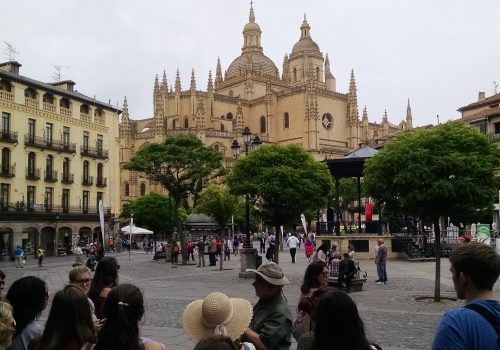In the Department of Languages and Literatures, students are encouraged to engage in many experiential learning and extra –curricular opportunities that we offer. Each language of the department provides different faculty-led study abroad programs and trips, clubs, internships, and service learning. We work closely with study abroad staff to ensure students get a truly international experience. We also collaborate with several national honor societies, and assist our students in finding awards and scholarships.
Learn more: Study Abroad Program
Recent Trips
Amazon to the Andes: Summer 2018
Cultural Expressions, Community Actions, and Global Citizenship – Dr. Juan Sánchez Martinez
Cuba: Spring Break 2017
Greta Trautmann, Associate Professor of Spanish and Maria Cebria, Lecturer in Spanish – took a group of students to Havana, Cuba. Students were enrolled in either LA 478 (Cultivating Global Citizenship (Trautmann) or SPAN 374 (Cuba Today: Visual Arts, Literature and History (Cebria).
Students met with scholars and professionals from various disciplines who engaged them with historical realities as well as with current developments in artistic movements, sustainability and cultural heritage and technology and communication. Non-academic excursions included: guided tour of La Habana Vieja (Old Havana); visits to the Cemetery of Colón; Museum of the Revolution, Contemporary Art Museum (Cuban Collection); visit to Cigar factory and Rum distillery; an overnight trip to the Terrazas biosphere and Vinales. Students also participated in a service project of El espiral community foundation, in which they assisted in re-painting an elementary school in a very modest neighborhood west of the city.
Spain and the Camino de Santiago: Summer 2017
Michelle Bettencourt, Associate Professor of Spanish and Rodger Payne (Professor & Chair, Religious Studies) led a group of students on an exploration of the rich history in Madrid and Toledo before spending a week in Valladolid, studying at one of Spain’s prominent universities and living with local families. The final week was spent hiking 117 kilometers of the Camino de Santiago (The Way of Saint James), one of the most significant pilgrimages of the Christian world, which dates back to the 9th century. Along the way, they passed through remote villages and towns, visited important architectural and artistic landmarks, and met other Pilgrims from around the world before arriving at the end of the Camino, Santiago de Compostela.
